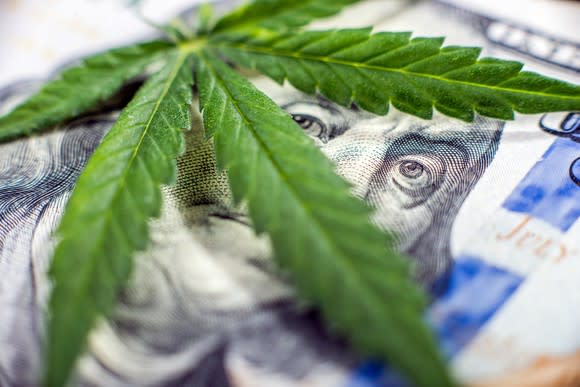Snoop Dogg's Marijuana Fund Is Budding After a $45 Million Capital Raise
To put it succinctly, the marijuana industry is growing like a weed. Cannabis research firm ArcView recently noted that legal pot sales in North America climbed 33% in 2017 to $9.7 billion, and they're expected to grow annually by 28% through 2021, hitting $24.5 billion a year in the process. You'd probably struggle to find an industry with more consistent growth prospects.
It's also an industry that's rapidly shifting focus. Gone are the taboos once associated with cannabis. In the U.S., an all-time record number of respondents want to see weed legalized according to Gallup's national October survey, with four other national polls over the past year showing similar results.

Image source: Getty Images.
Also gone are the expectations that no developed countries would legalize recreational weed. Canada's federal government is currently debating legislation that would legalize recreational marijuana for adult sale by this coming summer. In doing so, it's expected to be the first developed country in the world to do so, adding $5 billion or more in annual sales to its domestic weed industry in the process.
This rapid expansion has been fueling growth in direct cannabis players, such as growers, processors, distributors, and retailers. Canopy Growth Corp. (NASDAQOTH: TWMJF), arguably the biggest name in Canadian cannabis, is currently working with seven facilities sprawled over 665,000 square feet, but is constructing or developing new greenhouses over 3.7 million square feet in British Columbia. Canopy will likely be the largest domestic producer of cannabis if and when the green flag waves.
Snoop Dogg leads the ancillary cannabis business charge
But it's not just the direct players that have been privy to the buzz surrounding legal pot. Ancillary players – i.e., companies that don't directly deal with touching the cannabis plant – have seen their fair share of excitement. Examples would include consulting firms, accounting businesses, financing companies, marketing businesses, software developers for the cannabis industry, and so much more. As the cannabis industry expands, the breadth of these ancillary needs seems to grow just as quickly, if not faster.

Image source: Getty Images.
Understanding this growing need, and taking into account his longtime passion as a cannabis enthusiast, rapper and entrepreneur Snoop Dogg (real name Calvin Broadus) has taken the lead as an ancillary industry investor via his co-founded venture capital firm Casa Verde Capital (which translates to "green house").
This actually isn't Snoop Dogg's first foray into the cannabis space. The aforementioned Canopy Growth benefited by partnering with Snoop Dogg in February 2016 to launch the Leafs by Snoop brand just eight months later. Tweed, which is owned by Canopy, initially launched three strains of Leafs varieties in October 2016.
A blunt look at Casa Verde Capital
Today, Snoop Dogg's venture capital fund, which raised $45 million before closing to new investors (none of which are institutional, might I add), is actively looking for seed and Series A investments in the ancillary space. This is a fancy way of saying that the fund is aiming to write checks of more than $1 million to up-and-coming cannabis companies that won't touch the plant, then follow up with additional investments of $3 million to $5 million to a limited number of its most successful seed ventures.
To date, the company has made eight investments, including its latest, a $3.3 million seed investment in Green Tank Technologies, a developer of vaporization hardware. One of its larger investments is in LeafLink, a business-to-business marketplace that's designed to connect cannabis brands with retailers on a single platform.

Image source: Getty Images.
Considering how successful Casa Verde was in raising $45 million, one of the largest venture capital raises in the space of all time, it's not out of the question that additional venture capital firms pop up in the ancillary space, or that Casa Verde seeks a second round of financing. According to Karan Wadhera, managing partner at Casa Verde, in an interview with TechCrunch earlier this month, "We don't have any institutions [funding us] yet, but we saw a lot of them poking around as we were closing the fund."
You, too, can invest in this ancillary craze (but your choices are very limited)
For investors, most ancillary cannabis options are in penny-stock territory, which makes them inherently risky and generally avoidable. However, there is one stock over $200 million in market cap that does keep its hands off the plant, yet services the cannabis industry: Kush Bottles (NASDAQOTH: KSHB).
With Canada expected to legalize recreational marijuana, Health Canada laid out a series of guidelines that it expects retailers to follow. This includes child-resistant and tamper-evident packaging that's clearly labeled with health warnings on a bright yellow background. Though legal, the pot industry will have to jump through hoops to get its product on shelves. Kush Bottles will help growers and retailers do just that.

Image source: Getty Images.
Kush specializes in pop-top bottles and child-resistant containers for medical and recreational dispensaries, as well as other branding solutions. It currently serves more than 5,000 legally operated medical and recreational dispensaries in North and South America, as well as throughout Europe, and is responsible for selling more than 100 million packaging units a year. It describes itself as the "gold standard" for compliant products, and its operating results are beginning to reflect that. Sales grew by 258% in the first quarter from the prior-year period to $8.85 million. What's more, Kush Bottles generated a nominal profit of $94,615, which compares favorably to the nearly $162,000 it lost in Q1 2017.
Still, Kush is valued at quite the premium, and there aren't really any other pure ancillary choices for investors to choose from. While the ancillary cannabis arena is clearly exciting, investors are encouraged to tread cautiously in the cannabis space until we see how everything plays out in Canada.
More From The Motley Fool
Sean Williams has no position in any of the stocks mentioned. The Motley Fool has no position in any of the stocks mentioned. The Motley Fool has a disclosure policy.
